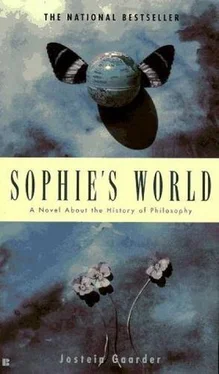Jostein Gaarder - Sophie's World - A Novel About the History of Philosophy
Здесь есть возможность читать онлайн «Jostein Gaarder - Sophie's World - A Novel About the History of Philosophy» весь текст электронной книги совершенно бесплатно (целиком полную версию без сокращений). В некоторых случаях можно слушать аудио, скачать через торрент в формате fb2 и присутствует краткое содержание. ISBN: , Издательство: BERKLEY BOOKS, NEW YORK, Жанр: Философия, на английском языке. Описание произведения, (предисловие) а так же отзывы посетителей доступны на портале библиотеки ЛибКат.
- Название:Sophie's World: A Novel About the History of Philosophy
- Автор:
- Издательство:BERKLEY BOOKS, NEW YORK
- Жанр:
- Год:неизвестен
- ISBN:0-425-15225-1
- Рейтинг книги:4 / 5. Голосов: 1
-
Избранное:Добавить в избранное
- Отзывы:
-
Ваша оценка:
- 80
- 1
- 2
- 3
- 4
- 5
Sophie's World: A Novel About the History of Philosophy: краткое содержание, описание и аннотация
Предлагаем к чтению аннотацию, описание, краткое содержание или предисловие (зависит от того, что написал сам автор книги «Sophie's World: A Novel About the History of Philosophy»). Если вы не нашли необходимую информацию о книге — напишите в комментариях, мы постараемся отыскать её.
Sophie's World: A Novel About the History of Philosophy — читать онлайн бесплатно полную книгу (весь текст) целиком
Ниже представлен текст книги, разбитый по страницам. Система сохранения места последней прочитанной страницы, позволяет с удобством читать онлайн бесплатно книгу «Sophie's World: A Novel About the History of Philosophy», без необходимости каждый раз заново искать на чём Вы остановились. Поставьте закладку, и сможете в любой момент перейти на страницу, на которой закончили чтение.
Интервал:
Закладка:
“I remember.”
“From time to time during this century there have been what are called ‘spiritualist revivals,’ the idea being that a medium could get into contact with a deceased person. Either by speaking in the voice of the deceased, or by using automatic writing, the medium would receive a message from someone who had lived five or fifty or many hundreds of years ago. This has been taken as evidence either that there is life after death or that we live many lives.”
“Yes, I know.”
“I’m not saying that all mediums have been fakes. Some have clearly been in good faith. They really have been mediums, but they have only been mediums for their own unconscious. There have been several cases of mediums being closely studied while in a trance, and revealing knowledge and abilities that neither they nor others understand how they can have acquired. In one case, a woman who had no knowledge of Hebrew passed on messages in that language. So she must have either lived before or been in contact with a deceased spirit.”
“Which do you think?”
“It turned out that she had had a Jewish nanny when she was little.”
“Ah.”
“Does that disappoint you? It just shows what an incredible capacity some people have to store experience in their unconscious.”
“I see what you mean.”
“A lot of curious everyday happenings can be explained by Freud’s theory of the unconscious. I might suddenly get a call from a friend I haven’t heard from for many years just as I had begun to look for his telephone number “
“It gives me goose bumps.”
“But the explanation could be that we both heard the same old song on the radio, a song we heard the last time we were together. The point is, we are not aware of the underlying connection.”
“So it’s either humbug, or the winning number effect, or else it’s the unconscious. Right?”
“Well, in any case, it’s healthier to approach such books with a decent portion of skepticism. Not least if one is a philosopher. There is an association in England for skeptics. Many years ago they offered a large reward to the first person who could provide even the slightest proof of something supernatural. It didn’t need to be a great miracle, a tiny example of telepathy would do. So far, nobody has come forward “
“Hmm.”
“On the other hand, there is a lot we humans don’t understand. Maybe we don’t understand the laws of nature either. During the last century there were a lot of people who thought that phenomena such as magnetism and electricity were a kind of magic. I’ll bet my own great-grandmother would have been wide-eyed with amazement if I told her about TV or computers.”
“So you don’t believe in anything supernatural then.”
“We’ve already talked about that. Even the term ‘supernatural’ is a curious one. No, I suppose I believe that there is only one nature. But that, on the other hand, is absolutely astonishing.”
“But the sort of mysterious things in those books you just showed me?”
“All true philosophers should keep their eyes open. Even if we have never seen a white crow, we should never stop looking for it. And one day, even a skeptic like me could be obliged to accept a phenomenon I did not believe in before. If I did not keep this possibility open I would be dogmatic, and not a true philosopher.”
Alberto and Sophie remained seated on the bench without saying anything. The pigeons craned their necks and cooed, now and then being startled by a bicycle or a sudden movement.
“I have to go home and prepare for the party,” said Sophie at last.
“But before we part, I’ll show you a white crow. It is nearer than we think, you see.”
Alberto got up and led the way back into the bookstore. This time they walked past all the books on supernatural phenomena and stopped by a flimsy shelf at the very back of the store. Above the shelf hung a very small card. PHILOSOPHY, it read.
Alberto pointed down at a particular book, and Sophie gasped as she read the title: Sophie’s World.
“Would you like me to buy it for you?”
“I don’t know if I dare.”
Shortly afterward, however, she was on her way home with the book in one hand and a little bag of things for the garden party in the other.
The Garden Party
... a white crow…
Hilde sat on the bed, transfixed. She felt her arms and her hands tremble, as they gripped the heavy ring binder.
It was almost eleven o’clock. She had been reading for over two hours. From time to time she had raised her eyes from the text and laughed aloud, but she had also turned over on her side and gasped. It was a good thing she was alone in the house.
And what she had been through these last two hours! It started with Sophie trying to attract the major’s attention on the way home from the cabin in the woods. She had finally climbed a tree and been rescued by Morten Goose, who had arrived like a guardian angel from Lebanon.
Although it was a long, long time ago, Hilde had never forgotten how her father had read The Wonderful Adventures of Nils to her. For many years after that, she and her father had had a secret language together that was connected with the book. Now he had dragged the old goose out again.
Then Sophie had her first experience as a lone customer in a cafe. Hilde had been especially taken with what Alberto said about Sartre and existentialism. He had almost managed to convert her—although he had done that many times before in the ring binder too.
Once, about a year ago, Hilde had bought a book on astrology. Another time she had come home with a set of tarot cards. Next time it was a book on spiritualism. Each time, her father had lectured her about “superstition” and her “critical faculty,” but he had waited until now for the final blow. His counterattack was deadly accurate. Clearly, his daughter would not be allowed to grow up without a thorough warning against that kind of thing. To be absolutely sure, he had waved to her from a TV screen in a radio store. He could have saved himself the trouble ...
What she wondered about most of all was Sophie. Sophie—who are you? Where do you come from? Why have you come into my life?
Finally Sophie had been given a book about herself. Was it the same book that Hilde now had in her hands? This was only a ring binder. But even so—how could one find a book about oneself in a book about oneself? What would happen if Sophie began to read that book?
What was going to happen now? What could happen now? There were only a few pages left in her ring binder.
Sophie met her mother on the bus on her way home from town. Oh, no! What would her mother say when she saw the book in Sophie’s hand?
Sophie tried to put it in the bag with all the streamers and balloons she had bought for the party but she didn’t quite make it.
“Hi, Sophie! We caught the same bus! How nice!”
“Hi, Mom!”
“You bought a book?”
“No, not exactly.”
“Sophie’s World ... how curious.”
Sophie knew she didn’t have the slightest chance of lying to her mother.
“I got it from Alberto.”
“Yes, I’m sure you did. As I said, I’m looking forward to meeting this man. May I see?”
“Would you mind very much waiting till we get home, at least. It is my book, Mom.”
“Of course it’s your book. I just want to take a peek at the first page, okay? ... ‘Sophie Amundsen was on her way home from school. She had walked the first part of the way with Joanna. They had been discussing robots . . .’”
“Does it really say that?”
“Yes, it does, Sophie. It’s written by someone called Albert Knag. He must be a newcomer. What’s your Al-berto’s name, by the way?”
“Knox.”
Читать дальшеИнтервал:
Закладка:
Похожие книги на «Sophie's World: A Novel About the History of Philosophy»
Представляем Вашему вниманию похожие книги на «Sophie's World: A Novel About the History of Philosophy» списком для выбора. Мы отобрали схожую по названию и смыслу литературу в надежде предоставить читателям больше вариантов отыскать новые, интересные, ещё непрочитанные произведения.
Обсуждение, отзывы о книге «Sophie's World: A Novel About the History of Philosophy» и просто собственные мнения читателей. Оставьте ваши комментарии, напишите, что Вы думаете о произведении, его смысле или главных героях. Укажите что конкретно понравилось, а что нет, и почему Вы так считаете.












